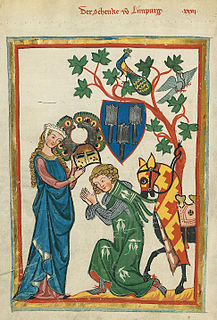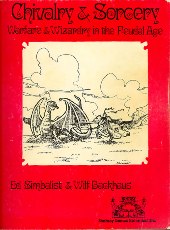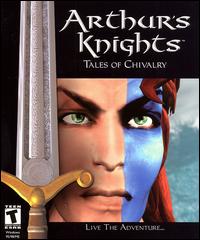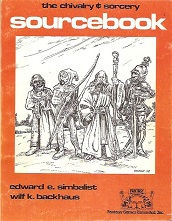
Fantasy Games Unlimited (FGU) is a publishing house for tabletop and role-playing games. The company has no in-house design teams and relies on submitted material from outside talent.

A knight is a person granted an honorary title of knighthood by a head of state or representative for service to the monarch, the church or the country, especially in a military capacity.

Sir Gawain and the Green Knight is a late 14th-century Middle English chivalric romance. It is one of the best known Arthurian stories, with its plot combining two types of folk motifs, the beheading game and the exchange of winnings. Written in stanzas of alliterative verse, each of which ends in a rhyming bob and wheel, it draws on Welsh, Irish and English stories, as well as the French chivalric tradition. It is an important example of a chivalric romance, which typically involves a hero who goes on a quest which tests his prowess. It remains popular in modern English renderings from J. R. R. Tolkien, Simon Armitage and others, as well as through film and stage adaptations.

Chivalry, or the chivalric code, is an informal and varying code of conduct developed between 1170 and 1220. It was associated with the medieval Christian institution of knighthood; knights' and gentlemen's behaviours were governed by chivalrous social codes. The ideals of chivalry were popularized in medieval literature, particularly the literary cycles known as the Matter of France, relating to the legendary companions of Charlemagne and his men-at-arms, the paladins, and the Matter of Britain, informed by Geoffrey of Monmouth's Historia Regum Britanniae, written in the 1130s, which popularized the legend of King Arthur and his knights of the Round Table. All of these were taken as historically accurate until the beginnings of modern scholarship in the 19th century.

Chivalry & Sorcery is a fantasy role-playing game that was first published in 1977 by Fantasy Games Unlimited. Created by Edward E. Simbalist and Wilf K. Backhaus in 1977, Chivalry & Sorcery (C&S) was an early competitor to Dungeons & Dragons (D&D). Historically, the two designers of the game were dissatisfied with the lack of realism in D&D and created a gaming system derived from it, which they named Chevalier. They intended to present it to Gary Gygax at Gen Con in 1977, but changed their minds once at the Con, where they met Scott Bizar who wrote out a letter of intent. After some final changes to get rid of the last remnants of D&D, Simbalist and Backhaus published the first edition of their game - now renamed Chivalry & Sorcery - shortly after the release of the first edition Advanced D&D Monster Manual.

Jousting is a martial game or hastilude between two horsemen wielding lances with blunted tips, often as part of a tournament. The primary aim was to replicate a clash of heavy cavalry, with each participant trying hard to strike the opponent while riding towards him at high speed, breaking the lance on the opponent's shield or jousting armour if possible, or unhorsing him. The joust became an iconic characteristic of the knight in Romantic medievalism. The participants experience close to three and a quarter times their body weight in G-forces when the lances collide with their armour.

An order of chivalry, order of knighthood, chivalric order, or equestrian order is an order of knights typically founded during or inspired by the original Catholic military orders of the Crusades, paired with medieval concepts of ideals of chivalry.

Mod DB is a website that focuses on general video game modding. It was founded in 2002 by Scott "INtense!" Reismanis. As of September 2015, the Mod DB site has received over 604 million views, has more than 12,500 modifications registered, and has hosted more than 108 million downloads. A spin-off website, Indie DB, was launched in 2010 and focuses on indie games and news.

Arthur's Knights: Tales of Chivalry is a Windows video game whose story revolves around the mythic Medieval era of which the legendary King Arthur is a contemporary. The player can choose to play either of two storylines: that of Bradwen the Celt or that of Christian Bradwen. In both storylines, he is the illegitimate son of the dying King Cadfanan, leader of the Atrebates tribe shortly following the Roman occupation. Bradwen's goal is to foil the evil attempts of his half-brother Morganor at securing a malevolent kingship for himself through which enactment of his evil intentions will be made possible. It was released on October 2000 in North America, and on November 2000 in Europe.
Chivalry is an action role-playing video game written by Richard Hefter, Steve Worthington, and Janie Worthington for the Apple II and published in 1983 by Weekly Reader Family Software.
Maurice Hugh Keen was a British historian specializing in the Middle Ages. His father had been the Oxford University head of finance and a Fellow of Balliol College, Oxford, and after schooling at Winchester College, Maurice became an undergraduate there in 1954. He was a contemporary and lifelong friend of Tom Bingham, later the Senior Law Lord, as well as of the military historian, Sir John Keegan, whose sister Mary he married.
Age of Chivalry is a multiplayer-focused total conversion modification for the Valve's Half-Life 2 using the Source engine. Founded by Rickard Drakborn, Jeff Simmons and Scott Chipman, and developed by a group of independent developers called Team Chivalry, the mod features a medieval theme and aims to provide enjoyable close-combat battles.
A self-styled order or pseudo-chivalric order is an organisation which claims to be a chivalric order, but is not recognised as legitimate by countries or international bodies. Most self-styled orders arose in or after the mid-18th century, and many have been created recently. Most are short-lived and endure no more than a few decades.
Brian R. Price is an American university professor, author, editor, publisher, martial arts instructor of the Italian school of swordsmanship, reconstructive armorer, and member of the Society for Creative Anachronism. He is Associate Professor of History at Hawai'i Pacific University, where he offers courses in the history of warfare, in counterinsurgency, and in strategy at the graduate and undergraduate levels. He speaks regularly at conferences both for his current field on counterinsurgency and in his earlier, and now secondary field, on chivalric topics. His page at https://hpu.academia.edu/BrianRPrice lists his current and recent research projects. He began his studies of medieval history in 1990, but began to shift his interests as the Afghan and Iraq wars progressed, increasingly emphasizing aspects of modern military theory, especially ways through which culture, doctrine and military practice interweave. These modern topics have been a prominent part of his work since his graduation from the University of North Texas and deployment to Afghanistan as part of the Human Terrain System in 2011-2012. He has spoken at the UK Ministry of Defence, at the Society for Military History, the World History Conference, several academic martial arts symposia, and appeared on television to discuss the situation in Ukraine.

Chivalry: Medieval Warfare is a multiplayer-focused hack and slash developed by Torn Banner Studios as their first commercial title. The game is set in a fictional world resembling the Middle Ages and offers similar gameplay combat to the Half-Life 2 mod, Age of Chivalry. On September 20, 2012, a trailer was released which set the release date to October 16, 2012. The developers had confirmed that the game would be PC exclusive initially, but in October 2014, they confirmed that the game would be coming to PlayStation 3 and Xbox 360 in December 2014. A standalone expansion pack called Chivalry: Deadliest Warrior was announced on August 23, 2013, as a tie-in for the television series Deadliest Warrior. It was released on November 14, 2013.
Martin Best is an English singer, lutenist, guitarist, and composer. Best has been active mainly in early music including Renaissance music, minstrel songs and the French troubadour traditions, in works related to Shakespeare, such as the sonnets and music to Shakespeare plays, and also in songs of the Swedish ballad tradition. He has often performed in constellations named Martin Best Consort and Martin Best Medieval Ensemble.

Maldita Castilla, known in North America and PAL regions as Cursed Castilla, is an arcade action video game developed by Locomalito and released in December 2012. The game is primarily based on myths from Spain and, to a smaller degree, other parts of Europe. Maldita Castilla was developed as a tribute to Ghosts'n Goblins.

Torn Banner Studios Inc. is a Canadian video game developer based in Toronto, Ontario, founded in 2010 by Steve Piggott of Team Chivalry, the team behind Age of Chivalry, a 2007-released Half-Life 2 mod.
Profound Decisions is a company running live action role-playing games in the United Kingdom. The company was founded in 2004 to run Maelstrom, a fantasy game with colonial themes which attracted around 900 players.

Chivalry & Sorcery Sourcebook is a 1978 role-playing game supplement for Chivalry & Sorcery published by Fantasy Games Unlimited.












